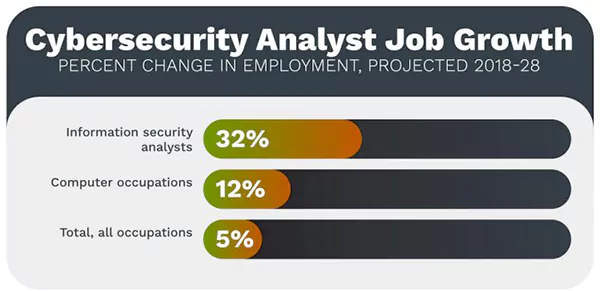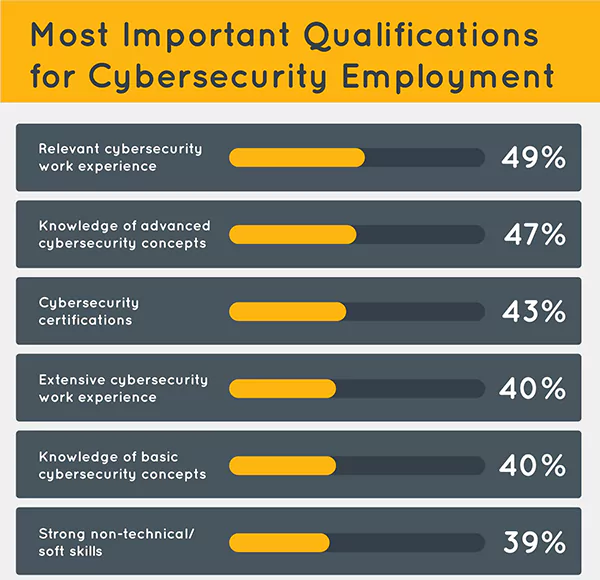How Companies View Graduates from Top Cybersecurity Bootcamps
Jump To Key Section
- What Is Cybersecurity Boot Camp Certificate Accreditation
- What Qualities Do Companies Look For In Cyber Security Bootcamp Graduates
- Comparing Standard Degree Holders With Cybersecurity Bootcamp Graduates
- List Of Possible Career Roles After Completing Cybersecurity Bootcamps
- Cybersecurity Bootcamp Salaries In Different Countries
- Final Verdict!
In this digital age, the need for skilled cybersecurity professionals is soaring high. This is because many businesses are facing a higher number of cyberattacks that increase downtime and pose a threat to company and customer data, etc. Click here to learn more about Cybersecurity Measures for Business Data you will know about it better here.
Businesses of all sizes are looking to hire skilled technical professionals who have completed technical boot camps. These courses offer students a competitive atmosphere where they can rapidly learn valuable technical expertise.
They can work on real-world cybersecurity problems and gain hands-on experience. The number of candidates for bootcamp cyber security is increasing as organizations actively seek more boot camp graduates.
What Is Cybersecurity Boot Camp Certificate Accreditation
A cybersecurity boot camp is an intensive course that helps candidates learn a wide variety of concepts, master basic skills, and gain technical expertise. It is often a short-term course that helps candidates acquire job-ready qualifications.
Accreditation can contribute to the quality of education, affect reputation, and provide economic aid to candidates. The majority of recruitment training attempts to make up for their lack of accreditation by employing various techniques.
These technical training leverage the strength of references, employment success rates, and corporate and educational connections.
THINGS TO CONSIDER
For admission to cybersecurity boot camps, students should look for pre-class prep work, admission requirements, skills taught, and format options.
What Qualities Do Companies Look For In Cyber Security Bootcamp Graduates
Companies have taken advantage of the opportunity to hire cybersecurity boot camp graduates, who all have a high level of expertise in every part of network safety and data security.
Since many prestigious tech businesses respect the qualities and expertise that tech-certified students provide, they are constantly looking to hire them.
Some key points that employers look for in trained students are:
Coding languages And Technical Expertise
A trained graduate should have hands-on experience with coding languages such as JavaScript, Python, SQL, PHP, and PowerShell. They should have technical skills like database design, web development, software engineering, etc.
Aptitude And Flexibility In An Ever-Changing Industry
Another factor that companies look for in network security candidates is their willingness to stay up-to-date with the industry.
The recruiting drive services have been able to update their courses rapidly with current, accurate qualifications in coding and system frameworks rather than a more structured method of traditional university degrees, which are less flexible to the industry’s constant change.
They will gain knowledge of emerging technologies in the virtual safety industry and know the value of continuous learning.
Ability To Think Critically And Solve Problems
Even though technical qualifications are valuable, companies nowadays are searching for technical experts with excellent soft skills as well.
These tech training frequently place an intense focus on thinking strategically and using problem-solving techniques, especially relevant in technological fields.
Candidates gain knowledge on pulling apart challenging situations, exercise creativity, and create code-based solutions.
Because these abilities are transferable to a variety of technical roles, employers seeking creative thinkers search for trained students as appealing prospects.
The graph below shows the percentage growth in employment for cybersecurity analysts from 2018 to 2028.

Comparing Standard Degree Holders With Cybersecurity Bootcamp Graduates
| Cybersecurity Bootcamp Graduates | Standard Degree Holders |
| Instead of providing a more extensive syllabus like the typical university degree, boot camps concentrate on one intensive area, which is cybersecurity skills. | A standard degree gives a conceptual understanding and managerial qualities of all the subjects. |
| Students in the boot camps are typically taught safety concepts like threat detection, primary safety procedures, software safety evaluation, and network safety. | Students with a traditional degree are taught about newly developed technologies, allowing students to get acquainted with such technology before entering the job market. |
The cybersecurity training provides students with guidance and services for their careers, some offering flexible learning choices. These details particularly help employers to hire the best fit for the company.
List Of Possible Career Roles After Completing Cybersecurity Bootcamps

If you have completed a cybersecurity recruiting camp, you can pursue a wide variety of career roles in the same sector. Some of them are:
- Information Security Manager
- Security Analyst
- Network Security Administrator
- Cloud Security Engineer
- Security Auditor
- Ethical Hacker
- Cybersecurity Trainer/Instructor
- Security Engineer
- Penetration Tester
- Cybersecurity Specialist
- Compliance Analyst
- Network Engineer
- Security Architect
- Application Security Analyst
- Threat Intelligence Analyst
- Security Consultant
- Risk Analyst
- Vulnerability Analyst
- Compliance Analyst
- Cryptographer
- Incident Responder
- Risk Manager
Cybersecurity Bootcamp Salaries In Different Countries
The salary for cybersecurity-trained students differs greatly depending on the career role, location, company, total years of experience, and more.
Here is a brief overview of the average salaries of cybersecurity boot camp graduates in different countries.
| Career Role | Average Salary In US | Average Salary In India | Average Salary In Australia | Average Salary In UK | Average Salary In Canada |
| Security Architect | USD 137,962 | INR 2,271,806 | AUD 152,898 | GBP 60,650 | CAD 116,282 |
| Ethical Hacker | USD 85,720 | INR 519,337 | AUD 101,736 | GBP 40,695 | CAD 119,000 |
| Cybersecurity Analyst | USD 80,967 | INR 593,719 | AUD 97,000 | GBP 46,523 | CAD 81,067 |
| Penetration Tester | USD 92,759 | INR 596,169 | AUD 89,243 | GBP 39,461 | CAD 76,925 |
| Cyber Security Engineer | USD 101,584 | INR 714,925 | AUD 97,760 | GBP 41,050 | CAD 97,346 |
| Network Security Engineer | USD 97,028 | INR 643,407 | AUD 90,000 | GBP 39,792 | CAD 84,037 |
| Information Systems Manager | USD 90,924 | INR 972,106 | AUD 117,453 | GBP 44,478 | CAD 93,637 |
Final Verdict!
At this point, leading IT industries are becoming more passionate about tech-trained students from cybersecurity training programs, which have become a common substitute for standard university courses.
The graduates from boot camp get the chance to learn a range of qualities, which they can apply from the beginning.
Finally, it is necessary to develop practical skills, stay informed of cutting-edge technologies, and look for chances to get in touch with prospective companies to secure a career in the IT sector.
Also Read: Cybersecurity for Companies: Protecting Your Digital Assets in Today’s Business Landscape








